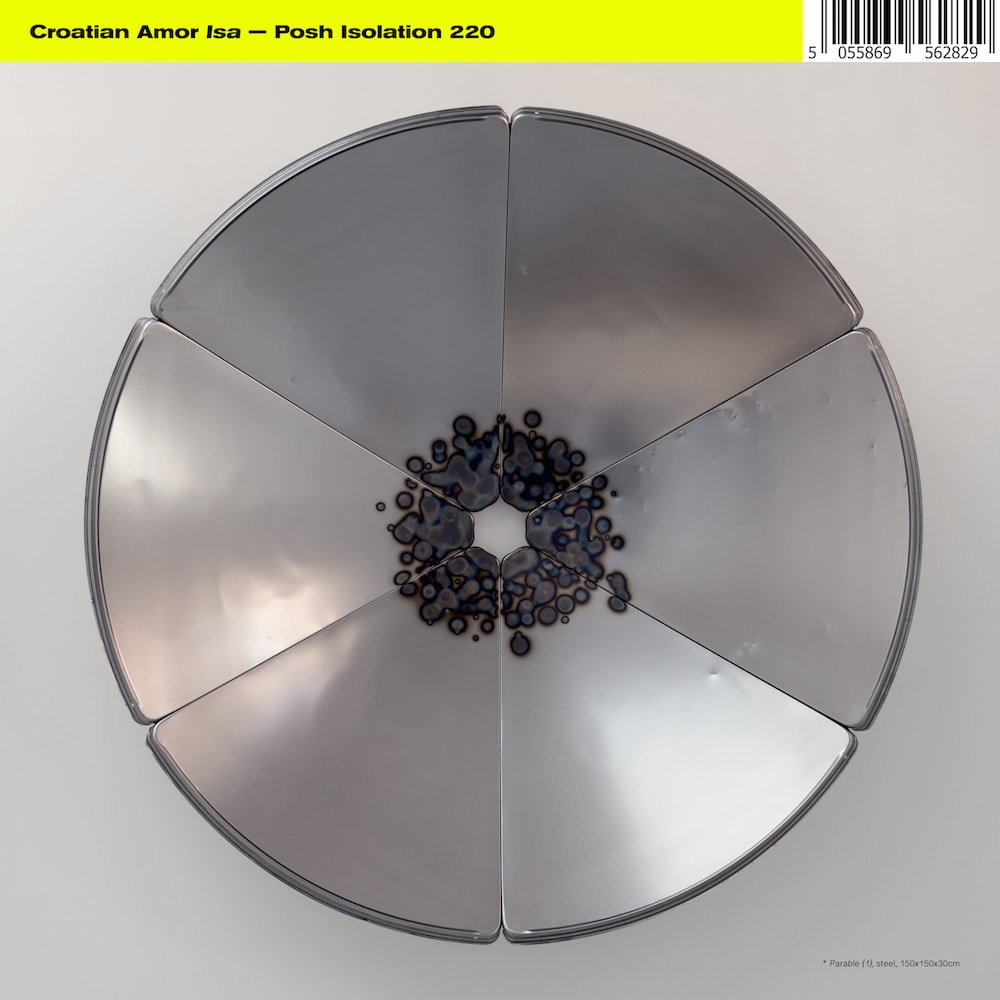Croatian Amor ‘Isa’
Can music be ugly and beautiful?

Score: 7.5/10
So much of Croatian Amor’s music, like that of collaborators Yves Tumor and Puce Mary and contemporaries like Arca and El Niño de Elche, is about finding beauty in what at first seems hideous. It sounds simple: disturb your listener with grotesque and abrasive stimuli—often both visual and auditory—to the point of repulsion, then comfort them with a big soppy cuddle. But it’s tough to get it right. Too much ugliness and your listener will be left holding their knees to their chest, rocking back and forth with eyes wide and teeth clenched; but too much loveliness and you risk sounding wan, dull, lame.
Isa, the sixth album by Posh Isolation co-founder Loke Rahbek as Croatian Amor, finds the artist seeking the perfect balance once again: aiming at both disquieting the listener and making their hairs stand on end. Following 2016’s largely ambient Love Means Taking Action, Isa is comparatively crunchy, with more mechanical percussion mixed in among its choral floatiness. And while Love Means was like a salve at the end of some terrible trauma, Isa is more like a swan song at the end of the universe.
In fact, I’m told by the press release that the album is “a nauseating narrative of virtual communication and eschatological programming.” Don’t worry, I’ve looked it up: eschatology is concerned with death, judgment, and the end of the world. With all the ‘90s rave tributes going around, it’s nice to know that someone in electronic music is still looking to the future, even if it is looking quite bleak.
Choosing the bleak future as his setting, Rabek tells a story during Isa, making it far more suitable for start-to-finish listening than something you can get the gist of with a few tracks. Starting at the beginning, opener, “Towards Isa,” is a statement of bleak intent, building a hellish atmosphere around a metallic female voice who intones robotic nothings about angels and so on—more on her soon. Evoking a dusty post-apocalypse cluttered with blinking screens and holograms, it’s a suitably weird intro.
A building fog billows through “In Alarm Light” and most of “Point Reflex Blue” too, both claustrophobic and breathy. The latter wheezes, emitting the occasional bass grunt before bursting into an eery, alien dance section—an arresting synth riff plays above skittish breakbeats; before it’s done the track unveils a sequence of gleaming, porcelain chords, then fades. Weird? Yep. Beautiful? Also yep. So far so good.
The album’s most beautiful moment comes early in “Siren Blur,” as Soho Rezanejad wails an ice-cold vocal, recalling Arca’s pop mutilations in its goose-pimpled intensity. Transience, the feeling that you’re hearing Rezanejad’s voice as though in a half-remembered dream, is very much part of the allure here, but in Isa’s case it slips away just a bit too quickly. I’d like to hear more of Rezanejad’s caterwauling, made a central attraction over a longer period á la Arca’s last album.
Instead, Rezanejad’s voice—along with those of Yves Tumor, Alto Aria, Jonnine Standish, and CTM—does way more talking than singing, and is often pitched up or down into computerish anonymity. Perhaps it was deliberate, but obfuscating the identity behind each voice turns all the album’s featured artists into a kind of omniscient tannoy system. Its “lyrics,” all of which are spoken not sung, are even more impersonal. Among them are: “All angels meet again”; “One day I saw an entirely black airplane in the sky”; “In your iris there is a perfectly updated map of the city”; and “Vomits into water. Vomits into lap. Eyes water. Big pupils. Vomits into eye. A paradise bird, flapping its wings.” Read into it if you want, though if you ask me or any of my secondary school English teachers, there’s no right answer.
Of course, the themes are uncertainty, insecurity, and apocalypse. These opaque utterances are designed to conjure all manner of eschatological images (am I using it right?) in the listener. Maybe you like the surreality, the ambiguity, the abstraction, but like a science fiction film that’s not quite bad enough to be ironic, it strikes me as just a bit naff. “Enhance photo, to reveal a picture of… bird, caught mid flight,” says the tannoy on “Into Salt.” Then: “Enhance again: the bird has a human face, screaming.” Indeed. It sounds like the future, but the future seems to sound quite a lot like a rubbish ‘80s B-movies.
Then again, even the best William Gibson novels include stretches of tedious dialogue. And in spite of Isa’s verbal contrivances, its back end is brilliant. Underneath the vocals, you’ll notice a gorgeous two-note string melody gently seesawing throughout “Into Salt.” There’s more talking on “Eden 1.2,” but it’s backed by a beatless sandstorm, bass scuzz swirling with ambient celeste to wondrous effect. It crescendos on the sublime “In World Cell,” as Rezanejad talks about tunnel systems before finally singing again: “do you feel the way that I do?” she coos again and again over distant organ chords. All of the album’s final three tracks are majestic works of cyberpunk balladry.
Succumbing to Croatian Amor’s narrative evocations for a moment, it feels like Isa’s final resolution carries a moral message: even in the year 3000, humans will still feel love. Or something. Whether I’ve got that right or not, what’s most striking is that the album really does tell a story. Its glorious conclusion arrives a little too soon, but it’s good enough to have you hitting rewind. Listen in a dark room, on headphones, and you’re likely to experience a few hairs-on-end moments. It’s ugly, yes, and sometimes contrived. But it’s beautiful too.
Isa LP is out now.
Tracklisting
01. Towards Isa
02. In Alarm Light ft. Soho Rezanejad
03. Point Reflex Blue
04. Eden 1.1
05. Siren Blur
06. Dark Cut ft. Jonnie Standish
07. Into Salt ft. Alto Aria
08. Eden 1.2
09. In World Cell

